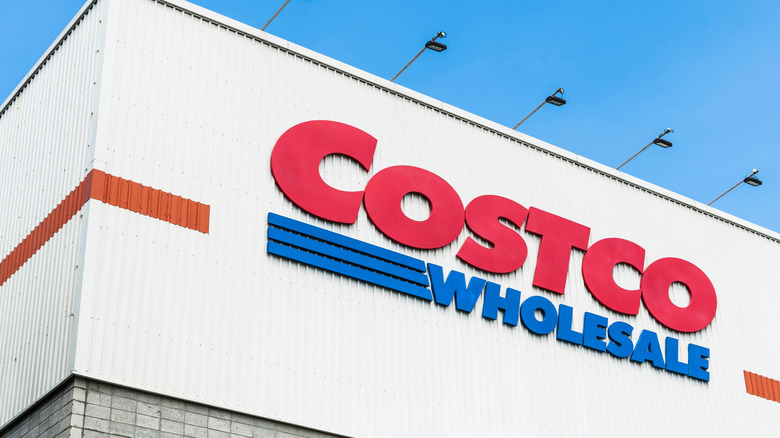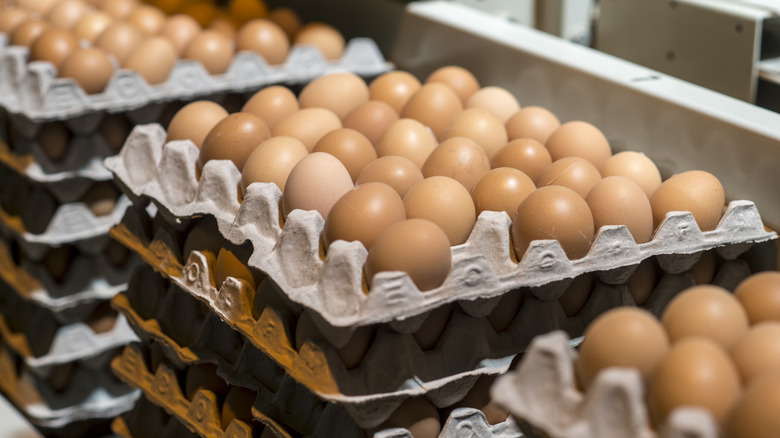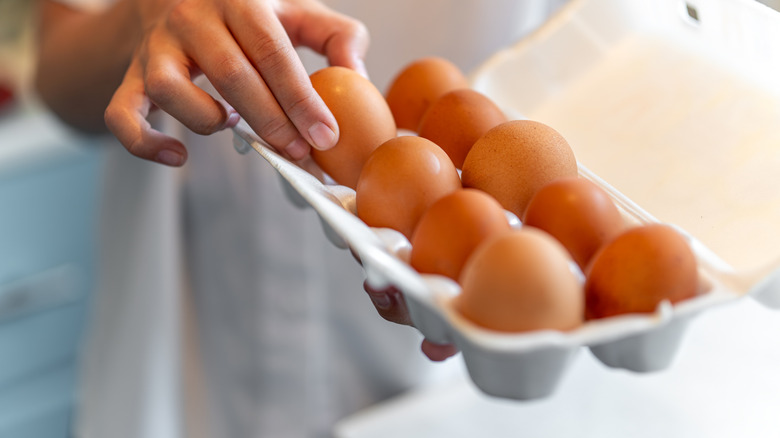Egg Recalls That Affected Millions
From omelettes to sunny side up on toast to nasi goreng, eggs are a global favorite. But while they are packed with nutrients, including protein, vitamin B12, and calcium, eggs do not come without risk.
Sometimes, consuming eggs can lead to sickness. This is usually due to a type of bacteria called salmonella. When this bacteria is ingested, it can cause unpleasant symptoms, including vomiting, diarrhea, and fever. Usually these symptoms will clear up on their own, but in some cases, salmonella can lead to severe illness and, in rare situations, even death.
There are ways to reduce the chance of salmonella. One option is to avoid eggs completely. There are plenty of plant-based alternatives on the market, including Simply Eggless and Just Egg. Although to be transparent, the latter once was recalled over listeria fears. Alternatively, scramble made with tofu is one protein-packed, whole food alternative to eggs. If you want to keep eating eggs, correct storage is essential (keep them refrigerated and consume within three weeks). You should also avoid consuming eggs raw and be careful where you buy them from (only purchase from refrigerated sections). And you should also keep an eye out for egg recalls.
Eggs can be recalled for many different reasons, including undeclared allergens and insecticide concerns, but one of the most common is fears over salmonella contamination. There have been many egg recalls in the past — keep reading to find out more about some of the biggest incidents in recent history.
Eggs recalled from 25 Costco stores due to salmonella concerns
In November 2024, Handsome Brook Farms announced it was recalling 10,800 packs of eggs sold under the Kirkland Signature brand from Costco stores across the U.S. due to concerns that they may be contaminated with salmonella bacteria. At the time of the recall, no mild or severe illnesses had been reported.
Based in New York, Handsome Brook Farms claims to be the U.S.'s leading supplier of organic pasture raised eggs. It is a certified B Corporation, which means it meets strict standards relating to social and environmental practices. According to the company, its hens have 108 square feet of personal outdoor space each. They are also fed with GMO-free, pesticide-free, and chemical-free feed.
However, none of this means they are immune from contracting salmonella bacteria. Chickens can pass this bacteria between them, and it can then be transferred onto any eggs they are carrying. It can then make its way to humans when we eat the contaminated eggs.
The potentially affected eggs from Handsome Brook Farms were accidentally sent to Costco locations in Alabama, North Carolina, Georgia, Tennessee, and South Carolina on November 22, 2024. According to the Food and Drug Administration (FDA), the eggs were never intended for retail distribution, but were sent out due to a supply chain error. Any customer who already purchased any of the potentially contaminated eggs was instructed to take them back to Costco for a refund or dispose of them at home.
France recalls 3 million eggs due to potential salmonella contamination
In October 2024, the egg distributor Ovalis announced the recall of eggs from the shelves of some of France's biggest supermarket chains, including Lidl, Carrefour, and Auchan, due to fears over salmonella. Leclerc, the largest supermarket chain in France, was also affected by the recall. The brand names affected by the Ovalis recall included Poitou Oeufs, Douce France, and Tout Frais Tout Français.
As well as major supermarkets, one charity was also caught up in the recall: A nonprofit called Restos du Coeur that distributes food packages and pre-prepared meals to people in need across France, some of which include eggs. While Ovalis claimed that only a small number of eggs had likely been contaminated with salmonella, it announced the recall of 3 million eggs to be on the safe side. This was because during the packing process, the contaminated eggs had likely been mixed with non-contaminated eggs.
At the time of the recall, no incidents of severe salmonella illness had been reported in France. However, there were eight reports of mild salmonella symptoms, which may have been linked to eggs supplied by Ovalis to retailers from the end of September to October 10.
FDA issues recall across nine states due to salmonella concerns
On September 6, 2024, the FDA first issued a recall for chicken eggs from Milo's Poultry Farms, which were sold under the brand names Milo's Poultry Farms and Tony's Fresh Market. At the time, this was because they had "the potential to be contaminated with salmonella" after FDA tests on samples from the farm came back positive for the bacteria. Since then, it has been confirmed that 65 people in nine states — including Wisconsin, Illinois, Michigan, California, Utah, Colorado, Iowa, Minnesota, and Virginia — have been affected by the outbreak. Most had mild illness, but around 24 people were taken to the hospital as a result of their symptoms.
Duck eggs from the brand Happy Quackers Farm were also impacted by the recall, which was given Class 1 status. According to the FDA, Class 1 means that there is "reasonable probability" that using a contaminated product may cause severe illness or death. In order to control the spread of salmonella, the FDA ordered the recall of more than 345,000 eggs. People who had already purchased potentially contaminated eggs were instructed to either return them to where they bought them from or dispose of them at home.
The FDA was clear that nobody should eat any recalled eggs, even if they appear fine from the outside. This is because salmonella can enter eggs through the tiny pores in their shells, which are not visible to the naked eye.
Ireland recalls duck eggs due to salmonella fears
On July 31, 2024, the Food Safety Authority of Ireland (FSAI) announced a recall of several batches of duck eggs from the Irish producer Slaney Farm. Again, this was due to concerns over the presence of the bacteria salmonella.
Just like chickens, ducks can carry salmonella. They can pass the bacteria on to their eggs through their feces, which enters the shell through its pores. Other bird species at risk of carrying salmonella include geese and quail. In fact, ducks, geese, and quail eggs are more likely to contain salmonella than eggs from chickens, so they should always be cooked to a high temperature before they are ingested.
Slaney Farm supplies its eggs to retailers, caterers, cafes, restaurants, and market stalls direct from County Carlow. The FSAI asked all of these to immediately stop selling the affected duck eggs and to display recall notices to customers.
Just a few days before the Slaney Farm recall was announced, the FSAI issued a warning surrounding the consumption of duck eggs. It explained that because duck eggs are bigger than chicken eggs, they should be cooked for longer to ensure that no parts of the eggs are left raw. To reduce the risk of salmonella, duck eggs should not be used in condiments like mayonnaise, which is made with raw eggs.
Eggs recalled in Minnesota over undeclared allergens
The reason for most egg recalls is due to potential salmonella contamination. However, there are other factors that can contribute to the decision to recall. One of these is mistakes in the packaging process. On June 30, 2024, Michael Foods, a Minnesota-based food company which claims to be the biggest processor of value-added eggs in the U.S., announced the recall of more than 4,600 liquid egg products called Fair Meadow Foundations Whole Eggs with Citric Acid.
This was because the packaging for the whole eggs with citric acid actually contained Breakfast Blend Scrambled Egg, which is a different product produced by Michael Foods. This mix-up meant that the ingredients listed on the side of the product were incorrect. It did not list the inclusion of milk, for example, which is a known allergen.
According to Food Allergy Research & Education, of the roughly 33 million Americans who suffer with food allergies, more than 6 million are allergic to milk. Like all allergies, milk allergies can be extremely serious. Symptoms vary in severity, but for some, they can result in a life-threatening reaction of anaphylaxis.
The mislabeled egg products from Michael Foods were sent to restaurants in nine different states: Alabama, Idaho, Louisiana, Minnesota, Nebraska, New Mexico, Ohio, South Carolina, and Utah. All recipients of the liquid eggs were told to either return them to the manufacturer or dispose of them immediately. There were no confirmed allergic reactions associated with the packaging error.
Coles and Woolworths in Australia recalls eggs over salmonella concerns
In March 2019, Food Standards Australia New Zealand issued a recall for eggs linked with a salmonella outbreak at Bridgewater Poultry Farm in the state of Victoria. The retailers affected included Woolworths and Coles, which are two of the leading grocery store chains in Australia. The brands affected included Woolworths private label eggs, Victorian Fresh Barn, and Loddon Valley. In response to the outbreak, which affected stores across New South Wales, Victoria, Tasmania, and Australia Capital Territory, Bridgewater Poultry Farm was placed into quarantine in an attempt to protect birds on any nearby farms. Salmonella can spread from one farm to another due to the movement of infected animals, as well as the movement of contaminated equipment, vehicles, and feed. Wild animals are also able to spread salmonella.
A few months after the salmonella outbreak, in June 2019, Bridgewater Poultry Farm was once again thrust into the spotlight when footage was leaked by Animal Liberation NSW that seemed to show workers abusing chickens. The workers were allegedly seen pulling on chicken's heads, banging birds against hard surfaces, and poking them with poles. The footage was taken in April, 2019, just one month after the news of the salmonella outbreak was announced.
Bridgewater Poultry Farm is no longer operated by the same management as it was in 2019. In 2024, it was sold with vacant possession. With room for 300,000 hens, it is likely it will remain a poultry farm.
Germany, Italy, and Malta recall eggs over salmonella fears
In August 2018, concerns over an outbreak of salmonella led to multiple recalls across Germany, Italy, and Malta. The affected eggs came from several different suppliers, including German company Eifrisch, Italian company Avicola Peligna, and Saint Joseph Farm in Malta. The potentially contaminated eggs were on the shelves of major retailers, including German locations of Aldi and Lidl. The year before the recalls were announced, one report from the European Union showed that following a decade of decline, salmonella cases were increasing.
The report examined several zoonotic diseases, which are diseases that are linked to animals, and showed that cases of listeria and campylobacter were also increasing. Like salmonella, both are food-borne pathogens that can cause serious illness in humans. Listeria is commonly found in root vegetables, processed meats (including salami and hot dogs), fruits, and seafood. Sometimes, it can also affect eggs. Campylobacter is often found in undercooked meat, including undercooked poultry. Salmonella can also be found in poultry meat as well as eggs.
According to the 2017 report, cases of salmonella were rising the most in Europe at this time. From 2010 to 2016, they led to more hospitalizations and deaths than other food-borne pathogens. In 2018, the recalls in Malta, Germany, and Italy were not linked with any reports of illness.
Europe recalls millions of eggs due to high insecticide levels
In 2017, millions of eggs were recalled across Europe because of the risk of contamination with an insecticide. Egg farms in the Netherlands were linked with the use of a chemical called fipronil, which is often used to control insects, including ants, fleas, and ticks. It is used widely in termite control products, for example, as well pet care products.
Fipronil is risky to humans. If ingested, it can cause symptoms including headaches and dizziness, as well as gastrointestinal and respiratory problems. The insecticide is also associated with skin and eye irritation. It may also cause tremors and convulsions. Most people who come into contact with fipronil will not develop severe symptoms. However, the U.S. Environmental Protection Agency does classify fipronil as a possible human carcinogen, which means exposure may lead or contribute to the growth of cancer cells in the body.
The eggs produced in the Netherlands contained higher than the recommended limit of fipronil and were sold in a number of countries in Europe, including the U.K., Germany, and Belgium. Amid the contamination concerns, around 180 Dutch egg farms were temporarily closed while links with the insecticide were looked into via a criminal investigation. The use of the insecticide was ultimately traced back to a Belgian pest control firm, which sold cleaning products to a Dutch poultry farm cleaning company. There were no reports of serious illness associated with the fipronil egg contamination scandal.
207 million North Carolina eggs recalled over salmonella concerns
In April, 2018, 207 million eggs were recalled from stores in nine states across the U.S., including Colorado, Florida, New Jersey, New York, North Carolina, South Carolina, Pennsylvania, Virginia, and West Virginia. The eggs came from a farm in Hyde County, North Carolina, which was owned by Rose Acre Farms, one of the leading egg producers in the U.S. They were sold in retailers and restaurants by a number of different brands, including Country Daybreak, Food Lion, Coburn Farms, Crystal Farms, and Sunshine Farms. Waffle House, the restaurant chain with more than 2,000 restaurants across multiple states in the U.S., was among those affected by the Rose Acre Farms recall.
According to the announcement from the FDA, the decision to recall millions of eggs was a voluntary action from Rose Acre Farms and was made "through an abundance of caution." The announcement also explained that there had been 22 reports of illness at the time of the recall.
Rose Acre Farms asked anybody with eggs implicated in the recall announcement to throw them away immediately or ask for a refund from the store they bought them from. Restaurants were advised to thoroughly clean equipment or surfaces touched by the potentially contaminated eggs.
550 million Iowan eggs recalled over salmonella outbreak
In one of the biggest egg recalls in recent history, in 2010, 550 million eggs were recalled in the U.S. due to an outbreak of salmonella. The eggs were produced by the Iowan company Hillandale Farms, which sold eggs under a number of brands, including Hillandale Farms, Sunny Farms, Sunny Meadow, and another Iowan company called Wright County Egg. Both companies were owned by the same farmer and business executive: Austin DeCoster.
The affected eggs were sold in a number of states across the U.S., including California, Arkansas, Iowa, Indiana, Kansas, Missouri, North Dakota, Ohio, South Dakota, and Wisconsin. In 2014, both DeCoster and his son, Peter DeCoster, were charged over the salmonella outbreak. This is because an FDA investigation revealed that conditions on the DeCoster's farms were filthy, and there were many traces of salmonella. They were also charged for deliberately mislabeling eggs with the wrong dates and for attempting to bribe an inspector to approve eggs that did not meet health and safety standards.
Both DeCoster and his son received jail time for the outbreak, which, according to the CDC, may have sickened around 56,000 people across the U.S. They were also fined $100,000 each. Over the years, according to an investigation by The Atlantic, DeCoster's farms have been linked with poor conditions for workers, child labor violations, beetle infestations that spread to nearby homes, and even a fire that resulted in the deaths of 100,000 birds.










